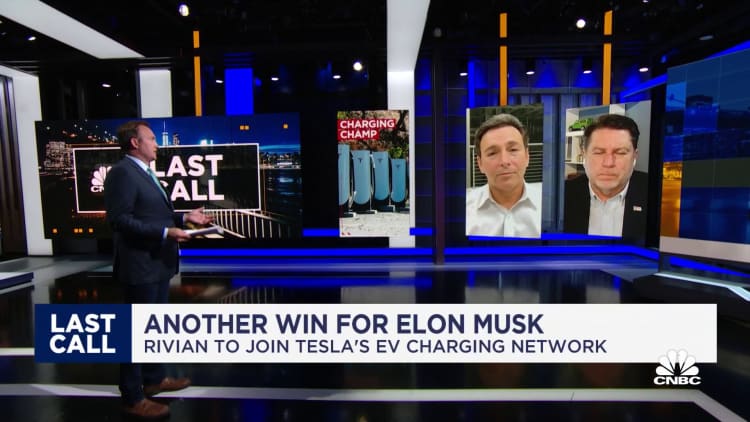[ad_1]
Cadillac advertises for its electric car in Shanghai on May 23, 2023. A traffic police woman stands below.
Hugo Hu | Getty Images News | Getty Images
BEIJING — Subsidies for electric cars aren’t enough to boost growth in China’s slowing economy.
One of the few detailed stimulus plans Beijing has announced this year extends tax breaks for electric car purchases, according to documents released Wednesday.
The incentives – which were set to expire this year – will now run until the end of 2027.
Authorities expect additional consumer savings of 520 billion yuan ($72.43 billion) as a result.
However, tax breaks don’t resolve the fundamental reason why people in China haven’t bought more electric cars: mileage concerns.
Charging challenges
Charging the car battery is still “relatively troublesome,” said Craig Zeng, CFO of online car information and shopping site Autohome. That’s according to a CNBC translation of his Mandarin language remarks.
He was speaking about the electric car market in general.
The layout of China’s residential areas means there aren’t many private parking spaces and there’s a limit to how many chargers communities can install, he pointed out.

Most people live in apartment compounds in China’s cities, with some parking underground or in lots surrounding the apartment buildings. In the capital city of Beijing, having a designated parking spot —without a battery charger — can cost nearly $100 a month or more on top of the apartment rent.
In such an environment, “after many people buy a car, the problem of charging it will gradually become more apparent,” Zeng said, noting the problem will affect people’s future decisions about buying an electric car.
During a press briefing Wednesday, Chinese officials noted the charging problems and called for faster installation of charging infrastructure in residential parking spaces – especially in new developments. That’s according to an official transcript of their remarks.
The officials pointed out the country has rapidly expanded its charging infrastructure over the last seven years, and that in central urban areas, charging stations offer the same coverage as gas stations.
However, China still has a long way to go.
More than 70% of total public fast chargers are located in just 10 provinces, the International Energy Agency said in its 2023 electric vehicle outlook report. That’s only about a third of the country.
Fast charging allows drivers to charge car batteries in less than an hour, but it still takes far longer than filling up a gas tank.
China still leads globally in the installation of public fast charging stations – almost 90% of the global growth in such chargers last year, the IEA said.
“Growth in EV sales can only be sustained if charging demand is met by accessible and affordable infrastructure, either through private charging in homes or at work, or publicly accessible charging stations,” the IEA report said.
Broader economic slowdown
Spurring demand for electric cars also faces challenges from tepid consumer spending.
China’s retail sales grew more slowly than expected in May from a year ago.
Auto sales, one of the largest components of retail sales by value, maintained steady year-on-year growth – but fell by 8% from the prior month. Many brands have also cut prices this year to boost sales.
Recent meetings of the top executive body, the State Council, noted the economic challenges and called for further support, specifically for new energy vehicles. But the announcements and interest rate cuts have fallen short of market expectations for broader stimulus.
“Although Beijing may still introduce certain policy measures to stabilize growth in coming months, the disappointing State Council meeting suggests measures for stimulating the economy could be introduced in a gradual manner, as decision-making is now highly centralized with an emphasis on ‘security,'” Nomura analysts said in a report on Monday.
Growing market penetration
China typically lumps electric cars into a broader category called new energy vehicles, which includes battery-only and hybrid-powered cars.
Penetration of new energy vehicles in overall passenger car sales has reached about one-third of the market in recent months, according to figures from the China Passenger Car Association.
That’s well beyond the official target of at least 20% penetration by 2025.
Autohome’s Zeng said he expects new energy vehicle sales penetration to remain between 30% and 40% this year, and reach 50% in 2025.
Chinese authorities have supported the growth of the domestic new energy vehicle market over the last decade in a bid to become a global player in the auto industry.
On the consumer side, cities such as Beijing and Hangzhou have made it far easier for drivers to get a license plate for an electric car versus a traditional internal combustion engine vehicle.
[ad_2]

